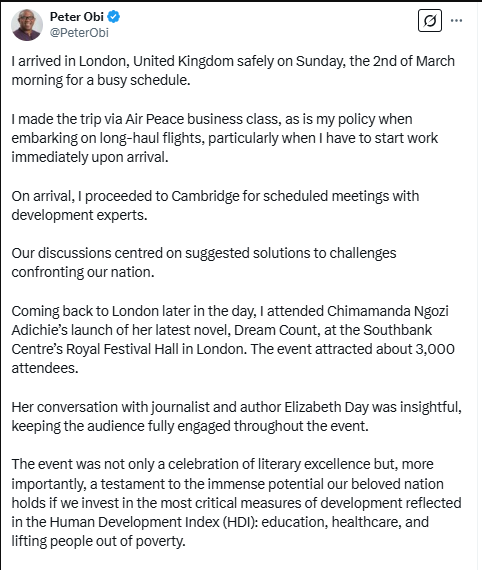Former Nigerian presidential candidate Peter Obi joined thousands of literary enthusiasts at London’s Royal Festival Hall to witness acclaimed author Chimamanda Ngozi Adichie’s triumphant return to the literary scene. The Sunday event marked the official UK launch of Adichie’s highly anticipated novel “Dream Count,” her first major literary work following a decade-long hiatus.
Obi, who traveled to London specifically for the occasion, shared his experience through social media posts featuring photographs of himself alongside Adichie at the packed venue. The former Anambra State governor was among approximately 3,000 attendees who gathered to celebrate the internationally renowned writer’s latest creative offering.
I arrived in London, United Kingdom safely on Sunday, the 2nd of March morning for a busy schedule,” Obi wrote in his social media update. He detailed traveling via Air Peace business class, explaining this aligned with his “policy when embarking on long-haul flights, particularly when I have to start work immediately upon arrival.
Before attending the literary event, Obi revealed he first visited Cambridge for scheduled meetings with development experts focused on “suggested solutions to challenges confronting our nation.” This blend of policy discussions and cultural engagement characterized the politician’s brief UK visit.
The centerpiece of Obi’s trip was clearly Adichie’s book launch, which he described as “not only a celebration of literary excellence but, more importantly, a testament to the immense potential our beloved nation holds.” The event featured Adichie in conversation with journalist and author Elizabeth Day, creating what Obi termed an “insightful” discussion that “kept the audience fully engaged throughout.”
For Adichie, “Dream Count” represents a significant milestone in an already illustrious career. The novelist, whose previous works include “Purple Hibiscus,” “Half of a Yellow Sun,” and “Americanah,” has established herself as one of Africa’s most influential literary voices. Her decade-long break from novel writing had heightened anticipation among readers worldwide, making this launch particularly momentous.
Literary critics have noted that Adichie’s return to publishing fiction coincides with growing international interest in Nigerian and African literature more broadly. Her consistent exploration of themes including identity, migration, feminism, and post-colonial experiences has resonated with global audiences while remaining deeply rooted in Nigerian contexts.
Obi’s presence at the event highlights the significant cultural diplomacy role played by Nigeria’s literary giants. Adichie’s international acclaim has made her an unofficial ambassador for Nigerian culture, with her TED talks, essays, and novels introducing millions of readers to nuanced perspectives on Nigerian life and society.
The politician connected his earlier policy discussions with the celebration of Adichie’s achievement, suggesting both pointed toward Nigeria’s untapped potential. Coupled with my earlier discussions on turning around our struggling nation and the exhilarating performance by @ChimamandaReal, I am convinced that with the energy and brilliance of our youth, a collective commitment, and guidance through good governance, the dream of a better Nigeria is within reach,” he wrote.
This optimistic vision reflects Obi’s consistent political messaging regarding Nigeria’s development path. He specifically referenced the Human Development Index (HDI), noting the importance of “education, healthcare, and lifting people out of poverty” as critical measures of national progress.
The launch event itself embodied the global reach of Nigerian creative output. Held at the prestigious Southbank Centre’s Royal Festival Hall, the gathering attracted not only literary enthusiasts but also members of the Nigerian diaspora eager to celebrate one of their country’s most recognized contemporary voices.
For Adichie, whose novels have been translated into over thirty languages and who has received numerous international literary prizes, the London launch represents just one stop in what will likely be a global promotional tour. Previous works have earned her recognition including the Orange Prize for Fiction, the National Book Critics Circle Award, and the MacArthur Foundation “Genius” Grant.
Obi’s trip underscores the intertwined nature of cultural achievement and national development in Nigeria’s contemporary discourse. By framing his attendance at a literary event within broader discussions about the country’s future, the politician implicitly acknowledged the role of arts and culture in national identity formation and international perception.
“I remain confident that all hope is not lost. A new Nigeria is POssible!” Obi concluded his post, incorporating his campaign slogan—a play on his initials—into his reflections on the event.
The London book launch continues a tradition of Nigerian literary excellence that stretches back decades to pioneers like Chinua Achebe and Wole Soyinka. As Adichie introduces “Dream Count” to global readers, she not only adds to her personal bibliography but also contributes to Nigeria’s rich literary heritage—a cultural achievement worthy of celebration by political figures and everyday readers alike.
While details about the novel’s plot remain closely guarded, literary circles anticipate that “Dream Count” will continue Adichie’s exploration of contemporary Nigerian experiences while introducing new narrative territories for the author whose voice has become synonymous with modern African literature.



